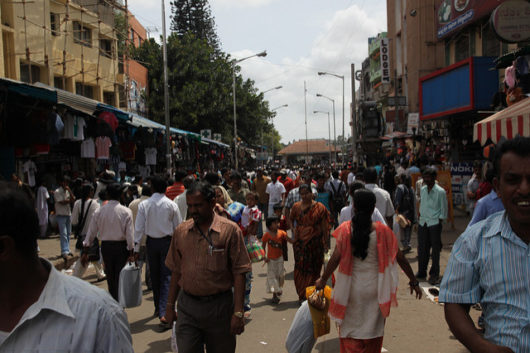The 10 Most Overpopulated Cites in the World

Overpopulation begets poverty. When a city is overpopulated, the ratio of available resources to the number of people sharply decreases. There simply is not enough to go around, because there are too many people for whom goods, services and economies such as food, water, shelter, health care and opportunities are available.
Below is a list of the 10 most overpopulated cities in the world. This list was compiled according to Demographia World Urban Areas and is based upon a study of 1,758 urban areas.
The 10 Most Overpopulated Cites In The World
10. Malegaon, India
Population: 720,000. Population density per square kilometer: 23,200. Malegaon is a city and Municipal Corporation in the Indian state of Maharashtra, nestled within the Nashik District. A series of bombings shook the land in 2006, but the country has since been able to retain peace in the land.
9. Vijayawada, India
Population: 1,900,000. Population density per square kilometer: 23,700. Vijayawada, which translates to “the Place of Victory,” is a city of nearly two million people located on the banks of the Krishna River. It is considered a major transportation hub and is known for being a significant location for Buddhist and Hindu ritual.
8. Tshikapa, The Democratic Republic of the Congo
Population: 810,000. Population density per square kilometer: 24,100. A city of Tshikapa is located roughly 30 miles north of the border with Angola. It is perhaps best known as a terrain fertile for diamonds. Since the first diamond was discovered on the land in 1907, diamond mining and exploitation have been the focus of the Tshikapa economy.
7. Hong Kong, China
Population: 7,380,000. Population density per square kilometer: 25,900. Being the Special Administrative Region of China, Hong Kong is the seventh most overpopulated city in the world, and perhaps one of the most familiar on the list. This is one of the most economically powerful cities in the world and it seemingly has something for everyone.
6. Macau, China
Population: 675,000- Population density per square kilometer: 26,100. Under Chinese sovereignty for 20 years, Macau was formerly under Portuguese control from 1557 up to 1999. Now a Special Administrative Region of China, Macau is known for its elaborate entertainment industry, so much so that it has come to be dubbed the “Las Vegas of Asia.”
5. Mumbai, India
Population: 23,260,000 million. Population density per square kilometer: 26,400. India’s largest city Mumbai is often considered among the major cities of the world. It is at the heart of India’s financial and commercial interests, built upon the site of an ancient settlement. Mumbai, formerly Bombay, also has the distinction of being the home of Bollywood.
4. Surat, India
Population: 6,200,000. Population density per square kilometer: 26,600. The eighth largest city in India and one of the world’s most rapidly growing cities, Surat plays a key role in the country’s textile industry.
3. Al-Raqqa, Syria
Population: 845,000. Population density per square kilometer: 27,200. Al-Raqqa, nestled along the Euphrates River, was an important city even in distant past, during the Abbasid dynasty (786-908 CE). Of recent, the city was prominence as the de facto headquarters of ISIS in their brief conquest of the land, but with ISIS overthrown, so too was this notoriety.
2. Mogadishu, Somalia
Population: 2,600,000. Population density per square kilometer: 28,600. The capital of Somalia, Mogadishu, has been considered one of the foremost ports of the world for thousands of years.
1. Dhaka, Bangladesh
Population: 17,400,000. Population density per square kilometer: 47,400. Dhaka, the most overpopulated city in the world and the capital of Bangladesh is known for its culture and education. It is also known for ornate architecture from its history as a prominent region in Muslim rule during the 17th century
These 10 most overpopulated cities in the world share many challenges, including a lack of resources and high poverty levels. However, with the unrelenting work of the international community, overpopulation is a problem predicted to end (with the current projections of global population peak in 2070 followed by a long-term decrease).
– Lacy Rab
Photo: Flickr
